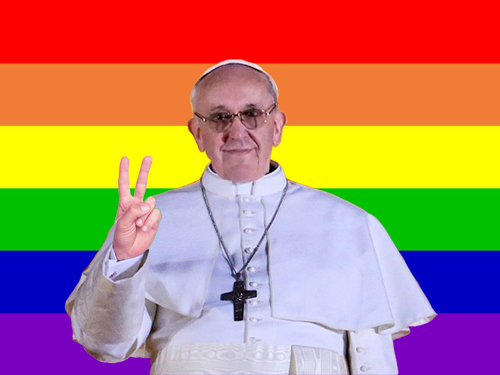
For a long time the Roman Catholic Church has seemed, to me, quite austere and removed from daily realities; its age-old traditions and white-clothed specter of a pope have often felt more symbolic than tangible.
The child-sex-abuse scandals and the lack of accountability in the church left a bitter taste in many mouths and called into question the relevance of an institution that couldn’t—or in some cases, wouldn’t—protect its most innocent. Pope Benedict XVI did little to change this perception, and many saw his attempts at resolving the sexual abuse scandal as too little, too late.
Something has happened, however. The tide seems to be changing, and instead of washing out to sea, it’s lapping up on the shore and touching people’s toes—real people’s toes. The change comes in the form of Pope Francis.
Watching the new pope on his recent visit to Latin America was quite remarkable. Gone were the images of a stiff, hunched-over man in a robe that looked like it weighed two tons, waving from behind a bullet-proof contraption. In their stead there were scenes of a vibrant, smiling, kind man shrugging off his security detail and making his way through a crowd, embracing little children and letting them walk alongside him. It was strangely exhilarating.
In Brazil, he visited one of the most desolate slums in the country, which the authorities have tried to bulldoze on several occasions, and garnered the nickname “the slum pope.” Addressing the giant crowd, he insisted that “[t]hose in power must stop pushing the poor aside.”
You get the feeling that it was more than rhetoric—he meant it. Probably because he does things like stop his motorcade to embrace a sick person. He also refuses to live in a palace. According to a Time magazine report, the day after he was named the next pope he proceeded “to pay his hotel bill; wearing sensible black shoes, not the showy red of his predecessor; getting his own coffee from a vending machine.”
There is something very human about this holy man. Something that says, “I’m like you.” He asks his followers to pray for him constantly, which means he actually believes their prayers matter.
But most revolutionary, of course, were his recent comments on homosexuality, which the church has vehemently protested. In an almost off-the-cuff conversation with members of the media, he asked, “If someone is gay and he searches for the Lord and has goodwill, who am I to judge?” This sent out shock waves that continue to reverberate around the world. No previous pope would have been caught dead saying that.
The thing is, this pope really believes that his religion is for everyone and, unlike so many that came before him, does not seek to exclude but rather to embrace. Truly a breath of fresh air.
In the same vein, he paid a visit to a desolate island off the coast of Italy and spoke to a crowd of Muslim refugees. Time reported that over the last 20 years, 6,000 of these immigrants have been lost at sea attempting to find refuge. Pope Francis asked, “Who wept for these people who were aboard the boat? For the young mothers who brought their babies? For these men who wanted to support their families? We are a society that has forgotten how to cry.”
One gets the feeling that this pope has not forgotten how to cry, or how to care for the most marginalized, and not just those who ascribe to his faith. Muslims, atheists—he doesn’t seem to care all that much. That’s perhaps the most beautiful part of it all. He sees human beings and not just masses of followers. He doesn’t just preach to the poor, he touches them. He lets his white robes get dirty.
It’s people like Pope Francis who make you believe—believe that his message is more than just rules and platitudes, that it’s about love.

